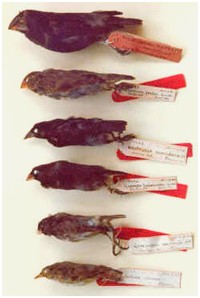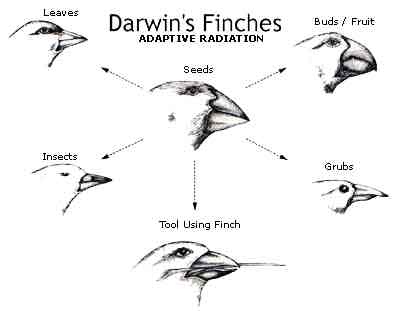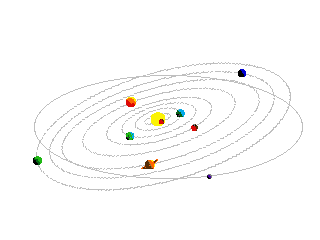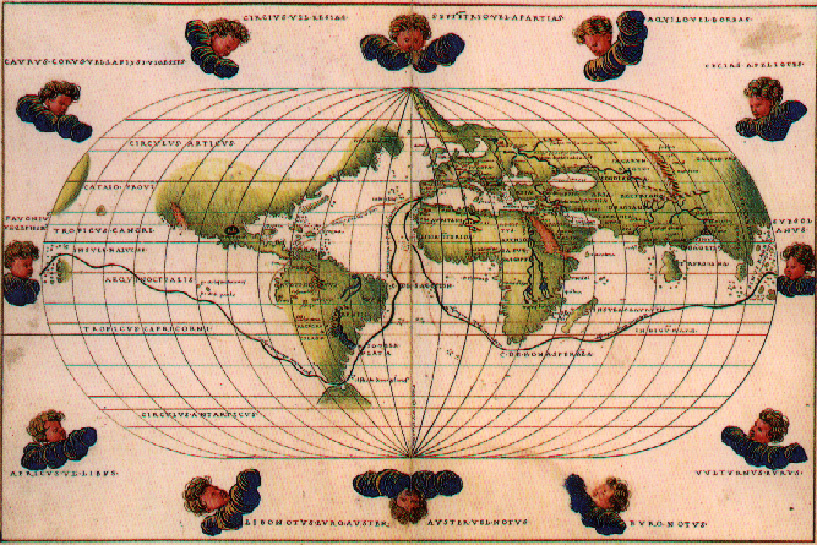 On the Origin
of Species
On the Origin
of SpeciesNavigating the site:
 Darwin's ideas
and their revolutionary character
Darwin's ideas
and their revolutionary character
Mayr's thoughts:
Darwin "raised some of the most profound questions about our origins that have ever been asked, and as a devoted and innovative scientist he provided brilliant, often world-shattering answers."
Page xiv.
Five theories suggested by Darwin, not the least of which was natural selection causing gradual change. Other findings were that variability is enormous and not all variants survive since there is competitive exclusion. In addition he argued that all species descend from a common ancestor and gradually over a long time the variants that survive make for such divergence that new species come into being. Nature makes itself different.
One Long Argument, pp. 36-37.
List Mayr's five parts of Darwin's beliefs.
five concepts | character of his ideas | 3 revolutionary examples | meaning of change | perspectives
A number of terms used for evolution by means of natural selection; meaning,1.
Evolution From essentialism to population thinking, steady change occurs.
2. Common descent Ancestors pass on traits to descendants by material means.
3. Multiplication of species due to adaptive radiation, isolation, & variation leading to new lines.
4. Gradualism nature avoids radical changes all at once.
5. Natural selection leads to an abundant production of genetic variation in each generation. Since not all the offspring can survive, and even fewer creatures live to successfully reproduce, there exists a process of culling or "selecting out" and loss of less adapted varieties takes place.Darwin collected these specimens on different islands of the Galapagos archipelago, but upon retuning home he assumed they were varieties of the same species until the Australian ornithologist, John Gould –who Darwin had sent the specimens to– disagreed with Darwin's single species interpretation. Gould informed him that there were at least three species in Darwin's collected specimens. Why, then Darwin mused would the single species on the South American continent lead, over geological time, to such diverging distinctions on the adjacent island chain.
In summary
Darwin is not a believer in progress, he had no clue as to the material means by which hereditary material is passed on in parental copulation and birth of offspring, and he was disinclined to attribute the process to a divine agent or spiritual entity for personal, familial and empirical reasons.Darwin was partially responsible for a revolution in our view of the human relationship to animals and the natural world or
Worldview: (in German) weltanschauung, means the set of related ideas that people or societies harbor, nourish, and hold despite evidence to the contrary and in contrast to the manner or process in which the world actually behaves or exists.
Three Examples of anomalous discoveries in science:
Darwin -- species are fixed and never go extinct was replaced by "struggle for existence," and descent from a common ancestor leading to adaptive radiation.
Galileo -- the planets move in perfect circles which Kepler had shown were really ellipses.
Columbus -- that the world was a sphere and that by landing in the Antilles, he had actually reached Japan, China or the "east Indies" islands.
Magellan's fleet circumnavigated –or traversed– the entire globe in 1522, proving the Earth is a sphere.
Why are worldviews important & what does a weltanschauung reveal?
A means in the history of ideas, science and intellectual thought of analytically separating out what civilizations believe, how they behave and what we know to be understood empirically about the world.
Darwin was not a social philosopher. He does not share a body of knowledge with 18th century or 19th century adherents to a transformational evolution or survival of the fittest as Herbert Spencer did. Nor does Darwin necessarily subscribe to the superiority of fit races over less fit competitive ethnic varieties within a single human race that many of his contemporaries believed to be a fact of life.
One Long Argument, Pp. 102-103.
Mayr | Thomas | Wilson | Hardin | Darwin | Margulis | Steingraber | Carr | Keller | Watson
Words | Terms | Glossary | Word webs | Basic vocabulary | Advanced Vocabulary | Antonyms | Synonyms

 The famous Galapagos finches
The famous Galapagos finches


